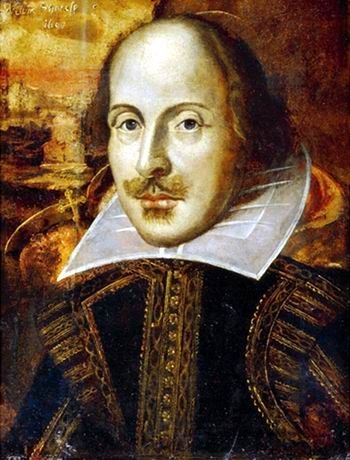
It sounds like the sort of character who would have been deeply unpopular in one of his plays. William Shakespeare was a 'ruthless businessman' and tax dodger, researchers have claimed.
研究人员近日声称,恰似莎翁戏剧中那些令人深恶痛绝的角色——莎翁本人就是“冷酷无情的商人和偷税漏税的家伙”。
Although he wrote plays that championed the rights of the poor and the needy, archived documents show the playwright was actually a wealthy landowner repeatedly dragged before the courts and fined for illegally stockpiling food and threatened with jail for evading taxes.
尽管莎翁笔下维护穷苦贫弱民众的权利,但档案资料显示,莎翁本人却是个富有的地主,多次被揪上法庭、因非法囤积粮食而罚款,甚至因偷税漏税差点蹲监狱。
He 'stored grain, malt and barley for resale at inflated prices to neighbours and local tradesmen' at a time when Europe was suffering famines, the academics said, and channelled the profits into land purchases.
研究人员说,莎翁囤积谷物、麦芽和大麦,等欧洲饥荒遍野时,再以高价转售给邻居及当地商人,以此牟取高额利润。
They added that Shakespeare did all he could to 'avoid taxes, maximise profits at others' expense and exploit the vulnerable – while writing plays about their plight'. And his approach of 'combining both illegal and legal activities' meant he could retire after a working life of only 24 years.
他们还说,莎翁一边创作有关弱势群体的戏剧,一边却又用尽一切办法逃税、从弱势群体身上尽可能地压榨利益。通过此类非法牟利手段,莎翁仅仅工作了24年便不劳而获、坐享其成了。
Researchers at Aberystwyth University carried out an academic study looking into Shakespeare's 'other life' as one of Warwickshire's biggest landowners and have uncovered the less than savoury side to Britain's greatest playwright.
在阿伯里斯特威斯大学,研究人员组织了一项学术研究,旨在挖掘莎翁作为沃里克郡大财主的“别样生活”,揭秘英国最伟大的文豪不为人知的阴暗一面。
The allegation he exploited famine has also led to suggestions that his Coriolanus, for years regarded as a plea for the starving poor, was in fact his way of trying to expunge a guilty conscience.
莎翁利用饥荒大发横财的推测恰好也表明,一直被认为是替穷苦民众伸张正义的《科利奥兰纳斯》,实不过是莎翁自己欲盖弥彰的良心不安作品罢了。
Jayne Archer, a researcher in Renaissance literature at Aberystwyth University, said in the Sunday Times: 'There was another side to Shakespeare besides the brilliant playwright — as a ruthless businessman who did all he could to avoid taxes, maximise profits at others' expense and exploit the vulnerable — while also writing plays about their plight to entertain them.
杰恩-阿彻在阿伯里斯特威斯大学研究文艺复兴时期的文学。他对《星期日泰晤士报》说:“除了伟大的剧作家身份外,莎士比亚还有另外一面——即逃税避税、无情压榨他人、欺凌弱势群体的商人,尽管他笔下尽是些伸张正义的故事。”
'Shakespeare is remembered as a playwright, but there was no copyright then and no sense that his plays could generate future income. That drove him to dodge taxes, illegally hoard [food] and act as a money-lender.
“莎翁是家喻户晓的剧作家。但当时还没有版权保护,因此他的戏剧作品并不能带来收入。所以,莎翁便靠逃税、非法囤积牟利,完全是个高利贷商人。”
Coriolanus depicts a famine created and exploited by rich merchants and politicians to maximise the price of food and includes the lines: 'They ne'er cared for us yet: suffer us to famish, and their store-houses crammed with grain.'
《科利奥兰纳斯》讲述了富商和政治家哄抬物价而造成大饥荒的故事,其中有句台词就是:“他们才不会管我们的死活呢。我们在这里忍饥挨饿,他们的店铺里却堆满了粮食。”
It has now emerged that as Shakespeare wrote the play at the height of the 1607 food riots, he was himself hoarding grain. As one of the biggest landowners in Warwickshire, he was ideally placed to push prices up and then sell at the top of the market.
如今看来,莎翁在戏剧中写到1607年粮食危机时,他本人正在囤积粮食。作为沃里克郡的大财主,莎翁占尽地利之便,抬高物价后又在市场上售卖。
In a paper, the academics wrote: 'Over a 15-year period Shakespeare purchased and stored grain, malt and barley for resale at inflated prices to neighbours and local tradesmen.
学者在文献中写道:“大概有15年之久,莎士比亚购买并囤积谷物、麦芽及大麦,然后再以高价转售给邻居和本地商人。”
'In February 1598 he was prosecuted for holding 80 bushels of malt or corn during a time of shortage. He pursued those who could not pay him in full for these staples and used the profits to further his own money-lending activities ...
“1598年2月,莎士比亚因在粮食短缺时囤积了640加仑的麦芽或玉米而被告上法庭。他通过向贫弱的民众收购主要粮食来牟取利润,然后进行高利贷交易……”
'Profits were channelled into land purchases. He also acquired tithes on local produce, including "corn, grain and hay", allowing him to cream off the profits from others' manual work.
“获得的盈利用来购置土地。他还从玉米、谷物、干草等农产品中牟取什一税,也就是从他人的血汗中榨取利润。”
'By combining both illegal and legal activities, Shakespeare was able to retire in 1613 as the largest property owner in his home town, Stratford-upon-Avon. His profits — minus a few fines for illegal hoarding and tax evasion — meant he had a working life of just 24 years.'
“通过正当或不正当的买卖,莎士比亚很快就在家乡埃文河畔的斯特拉特福积累了巨大财富,扣除少数因非法囤积和逃税而缴纳的罚款,他可谓获利匪浅。早在1613年仅仅工作了24年,莎翁便可坐享其成了。”
Shakespeare's experience as a rich landowner at a time of famine may be reflected in plays such as King Lear, which depicts an ageing monarch trying to divide his lands, and the food they produce, between his daughters.
莎翁在大饥荒时期的大财主经历在《李尔王》等戏剧中可见一斑——年迈的君王试图在两个女儿之间划分土地和生产的粮食。
Professor Jonathan Bate, the Shakespeare scholar and provost of Worcester College, Oxford, said Archer and her colleagues had performed a valuable service in setting Shakespeare's work in the context of the famines and food shortages of the period.
乔纳森-贝特是牛津大学伍斯特学院的教务长,同时也是研究莎士比亚的学者。他说,阿彻女士及其团队的发现对研究莎翁笔下大饥荒与粮食短缺时期的作品很有价值。


